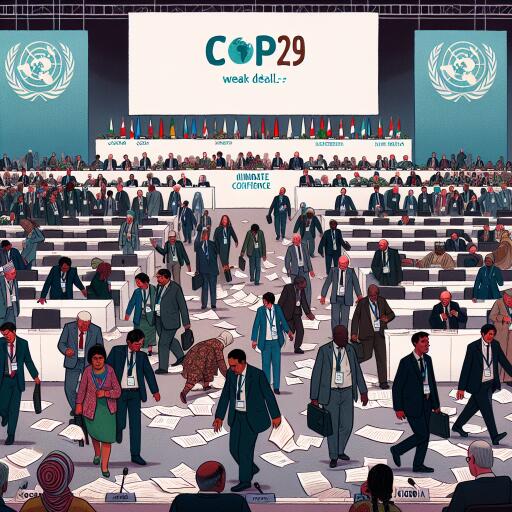
Nigeria: COP29 Ends Amidst Walkouts and Weak Deals
The 29th United Nations Conference on Climate Change (COP29) concluded in Baku, Azerbaijan, early Sunday morning, leaving many developing countries and environmental activists frustrated with the outcomes.
Dubbed the “Climate Finance COP,” the summit fell markedly short of expectations, committing only $300 billion annually by 2035 to assist vulnerable nations. This is a significant underachievement compared to the $1.3 trillion experts believe is necessary.
Developing nations had been advocating for $500 billion annually in grants—rather than loans—to prevent further worsening of their debt situations. Still, affluent countries resisted binding agreements and absolved themselves from historical accountability for their disproportionate greenhouse gas emissions.
Mohamed Ali, Chair of the African Group of Negotiators, adopted a practical approach, acknowledging the limitations inherent to multilateral efforts.
“While not all aspirations are fully realized, these commitments are acts of survival, shared prosperity, and solidarity,” Ali stated.
Ali drew on the Southern African principle of Ubuntu, highlighting the interconnectedness of humanity. “When Africa loses, the world loses. When Africa thrives, the world thrives,” he emphasized, urging nations to move beyond divisive actions.
Internal Disagreements
Tensions among vulnerable nations came to light when the Nigerian delegation proposed that China and India be reclassified as developed nations, aligning with wealthier nations’ perspectives.
This contentious proposal exposed rifts within the Global South, weakening the unity of climate-vulnerable countries.
Amidst the disagreements, small island states and least-developed countries staged a significant walkout, accusing developed nations of hindering negotiations.
Fossil Fuel Influence
The presence of fossil fuel lobbyists, surpassing the numbers present in most country delegations, attracted sharp critique. Prominent figures from major oil firms, including Aramco and BP, actively participated in discussions, leading to accusations of undue influence.
Activists condemned the summit as a “fossil fuel lobbyist’s playground,” with Saudi Arabia openly against the idea of phasing out fossil fuels.
Instead of focusing on reducing fossil fuel dependency, the summit emphasized controversial solutions such as carbon markets, geoengineering, and portraying fossil gas as “clean energy,” which deviated from the transition momentum gained at the previous COP28.
China offered one of the summit’s few highlights by increasing transparency regarding climate finance and expressing openness to voluntary contributions from the Global South. Meanwhile, the European Union attempted mediation between the various factions, but wealthier nations’ hesitancy to enhance financial contributions undermined these efforts.
Anticipating COP30
Looking ahead, Brazil’s President Luiz Inácio Lula da Silva has set ambitious expectations for COP30, branding it the “turnaround COP.” Scheduled to take place in Belém, the upcoming summit will focus on transitioning away from fossil fuels and protecting forests.
UNFCC Executive Secretary Simon Stiell described the $300 billion pledge as “an insurance policy for humanity,” warning that its efficacy depended on the timely honoring of commitments.
Despite these assurances, the outcome of COP29 feels inadequate to many. Sierra Leone’s Minister of Environment, Jiwoh Abdulai, captured the prevailing mood: “This deal is too little, too late. Vulnerable nations will continue to suffer from inaction.”
As the climate emergency intensifies, the struggle for climate justice and accountability is far from over.





Leave a Reply